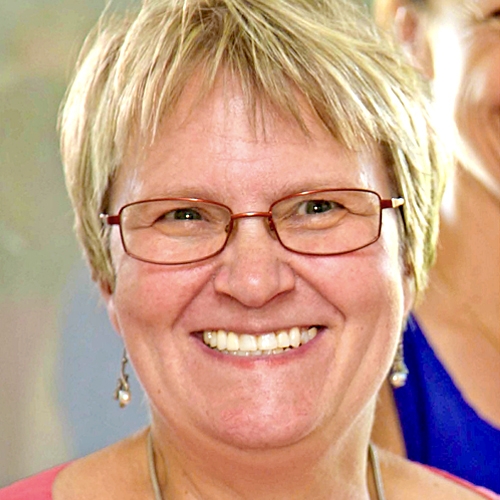
Neonatal / NICU Care Continuing Education Course Bundle #3 (10.5 Hours)
Originally offered at our GOLD Neonatal Online Conference 2019. GOLD Neonatal provides an unique educational opportunity for healthcare professionals caring for high-risk neonates.
When working with this vulnerable population and their families, it's essential to stay up to date with the new research and shifts in thinking and understanding in the neonatal field.
Gain new insights into topics such as EKG interpretation, the impact of the legalization of marijuana, the transition to home from the NICU, nurses as leaders and so much more. With speakers such as Nicholas Embleton, Anna Axelin, Jacqueline McGrath, Vicki Culling, and Karen Lasby to name just a few, this line-up of topics and speakers is not to be missed!


Anna Axelin’s academic career has included conducting quantitative and qualitative research on maternity and neonatal care in multidisciplinary and international research groups. In the Academic year 2011-2012, she joined the faculty of Department of Family Health Care Nursing in University of California San Francisco for her post-doctoral research. Since 2018, she was appointed as an associated researcher in the Department of International Maternal and Child Health at University of Uppsala in Sweden. In addition to the academic career, she has ten-year working experience as a NICU nurse.
She is leading the Health in Early Life and Parenthood (HELP) research group which aims to promote health and welfare in the early stages of life. Her special research interest is how to keep parents and sick newborns together throughout the infant hospital stay and strengthen their relationship already during pregnancy. Anna Axelin’s other research interests include pain and sleep in neonates, and the implementation of evidence-based practice in maternity and neonatal care with the help information technology.
Objective 1: Describe the importance of infant-parent closeness
Objective 2: Define the major causes of separation
Objective 3: Explain how staff can facilitate infant-parent closeness in neonatal care
Infants should not be separated from their parents. Parent-infant closeness is vital for the development of parent-infant relationship and consequently for parental well-being and optimal infant development. However, every year, due to medical care or hospital routines detrimental separation affects millions of infants. This presentation explores parents’ and staff’s perceptions of infant-parent closeness and separation in maternity care, delivery ward and neonatal intensive care environment. Based on these experiences, barriers (e.g. care routines and resources) and facilitators (e.g. patient centered communication skills, parent autonomy, single family rooms and couplet care) for closeness will be examined and potential strategies to facilitate parent-infant closeness in neonatal care are discussed.


Karen has worn a number of hats in her nursing career but always comes back to her passion for premature babies. Her background includes NICU nurse, transport nurse and NICU educator, rural nursing, staff development, pediatrics, pediatric intensive care, and community health. For over 20 years Karen has lead Calgary’s specialized “Neonatal Transition Team”, which she will talk about today. Karen has presented locally, nationally, and internationally and has also been co-investigator in several research and quality improvement studies examining outcomes for very low birth weight infants. For nearly 30 years, Karen taught, wrote instructional material, and produced on-line courses for nurses to earn a certificate in neonatal nursing through Mount Royal University. Karen is a past-president of the Canadian Association of Neonatal Nurses and served on this national board for 12 years, and on the international board of the Council for International Neonatal Nurses for 3 years. In 2019, Along with co-author, Tammy Sherrow, Karen published the book “Preemie Care: A guide to navigating the first year with your premature baby”.
Topic: “Zooming Ahead”; Post-NICU Discharge Very-Low-Birth-Weight Infant Follow-up Program Goes Virtual - [View Abstract]
Objective 1: Describe common challenges that premature babies and parents experience beyond the NICU
Objective 2: Demonstrate anticipatory guidance to share during NICU discharge teaching
Objective 3: List five key tips to enhance neonatal outcomes and parent preparation for challenges at home
Discharge teaching programs are typically established based on what we as health care providers think parents need to know. Reality sets in very quickly for families after taking home a premature newborn. Despite thorough discharge teaching and parent involvement in hospital, parents are surprised by the challenges they face post-discharge. Feeding, behavior, reflux, sleep, and parenting troubles top the list. Based on over twenty years’ experience working with premature infants and their families beyond discharge, the presenter will reveal common challenges encountered and discuss research-based and practical strategies for the NICU team to share with parents to smooth the transition home. A greater knowledge of post discharge sequelae and preventative strategies will aid the NICU team in optimizing the discharge process and ultimately improve outcomes for babies and parents.


Clinical nurse researcher in the area of breastfeeding preterm infants and skin-to-skin contact at dept. of Neonatology, Copenhagen University Hospital Rigshospitalet and leader of Knowledge Centre for Breastfeeding Infants with special needs. Member of the Nordic and Quebec Working Group expanding the BFHI for neonatal wards (Neo-BFHI).
Describe how breastfeeding benefits preterm infants and challenges the mother and infant
Describe the progression of breastfeeding milestones in preterm infants
List factors in infants and mothers and six clinical practices associated with exclusive
breastfeeding of preterm infants
Breastfeeding of preterm infants is associated with factors in infants, mothers and clinical practice.
Extremely preterm infants establish exclusive breastfeeding at a higher PMA and have twice the risk of not being exclusively breastfed at discharge. Low education, less breastfeeding experience, and smoking are maternal factors negatively associated with exclusive breastfeeding.
Admitting mothers to the NICU together with the infant immediately after delivery is associated with earlier establishment of exclusive breastfeeding. The later the initiation of breast milk expression, the later the establishment of exclusive breastfeeding, and the higher risk for failure of exclusive breastfeeding at discharge and inadequate breastfeeding duration. The use of a nipple shield is associated with failure of exclusive breastfeeding at discharge and inadequate duration of exclusive breastfeeding. Minimizing the use of a pacifier during breastfeeding establishment and test weighing the infant are positively associated with exclusive breastfeeding at discharge.


M. Petrea Cober, PharmD, BCNSP, BCPPS, attended the University of Tennessee, College of Pharmacy in Memphis, Tennessee. She completed her PGY1 Pharmacy Residency at Penn State Milton S. Hershey Medical Center in Hershey, Pennsylvania, and her PGY2 Pharmacy Residency in Pediatrics at the University of Michigan Hospitals and Health System in Ann Arbor, Michigan. She is currently the Clinical Coordinator - Neonatal Intensive Care Unit and PGY1 Residency Program Director at Akron Children's Hospital where she provides clinical services and precepts pharmacy students, PGY1 pharmacy residents, and PGY3 medical pediatric residents. She is also the Section Lead for Specialty Care and an Associate Professor in the Department of Pharmacy Practice at Northeast Ohio Medical University (NEOMED). Her didactic teaching is in the areas of pediatrics, women’s health, and nutrition. Dr. Cober's expertise is in pediatric pharmacotherapy, nutrition, ethanol lock therapy, and management of patients with intestinal failure. She is active in local, state, and national pharmacy organizations.
Objective 1: Discuss the macronutrients and micronutrients used in parenteral nutrition and the goals of therapy for neonatal patients Objective 2: Recite common challenges regarding the provision of adequate calcium and phosphorus in parenteral nutrition Objective 3: Describe challenges related to compatibility of various medications and parenteral nutrition solutions
Critically ill neonates and infants are often unable to maintain adequate nutrition through the enteral route and require parenteral nutrition. Due to their increased nutritional needs, small size, and limited overall fluid intake, neonatal/infant parenteral nutrition requires specialized knowledge of stability and compatibility of parenteral nutrition macronutrients and micronutrients. Special attention will be given to issues involving protein requirements, glucose infuse rates, provision of lipid injectable emulsions utilizing newer products, calcium and phosphate compatibility, and challenges with limited intravenous access.


Dr. Wallman is an Assistant Professor at the Loretto Heights School of Nursing and the Coordinator of the Neonatal Nurse Practitioner Program. She has over 30 years’ experience as an NNP with clinical experience ranging from low to high risk neonates including air transport. She has had a particular interest in perinatal substance use disorders and the impact on the neonate and family. She has been the co-chair of the Perinatal Substance Abuse Advisory Panel for UCHealth North and on the Colorado Substance Exposed Newborn Steering Committee since 2008. In 2015 she was the recipient of the Colorado Nightingale Award and in in 2006 the Distinguished Service in Neonatal Nursing Award from the National Association of Neonatal Nurses. She also served as the only nurse in the nation on the American Academy of Pediatrics Committee on Fetus and Newborn where best practice standards for the care of neonates are developed and she currently serves on the Editorial Board of NeoReviews for the American Academy of Pediatrics.
Objective 1: Discuss the increased newborn exposures to THC correlated with its legalization
Objective 2: Discuss three potential complications of newborn THC exposure through pregnancy and breastfeeding
Objective 3: Discuss evidence based education and management strategies for working with newborns exposed to THC through pregnancy and breastfeeding
States with legalized marijuana have faced increased use of marijuana by women during the perinatal period and complexities in decision making regarding management of infants exposed to marijuana through pregnancy and breastfeeding. Staff and family often report inconsistent messaging and practice management patterns among staff and providers in response to these patients. Results of a comprehensive literature search will be utilized to discuss the development and implementation of best practice strategies to address the unintended consequences of increased use of THC during pregnancy and breastfeeding correlating with the legalization of THC. This presentation will provide a review of current scientific evidence available to support the development of guidelines for consistent messaging and management of these newborns and their families during pregnancy and while breastfeeding.


Dr Vicki Culling is the Director and principal trainer for Vicki Culling Associates. Vicki is a bereaved parent and has been actively involved in Sands (an organisation that supports families when a baby or child dies) for over fifteen years. The stillbirth of her first daughter led her to utilise her skills, in supporting bereaved parents and families and educating health professionals with in-person workshops and online learning. Vicki was a founding member of the NZ national Perinatal and Maternal Mortality Review Committee (PMMRC) set up in 2005 and charged with collecting data on perinatal and maternal mortality and morbidity in NZ. Vicki is a current member of the NZ Ministry of Health’s Maternal Fetal Medicine Governance Board and vice-Chair of the National Perinatal Pathology Clinical Governance Committee. She also works as a lay reviewer for the Medical Council of NZ and the Dental Council of NZ. She lives in Wellington with her husband Kevan and daughter Phoebe.
Objective 1: Compare traditional and contemporary approaches to grief
Objective 2: Describe hierarchy of loss and minimisation of grief.
Objective 3: Describe and reflect on their philosophy of care in regard to perinatal and infant loss
In this presentation, we will explore grief and baby loss from a first-world, Western perspective. We will reflect on how our attitudes to grief have formed and look at the differences between traditional and contemporary approaches to grief and the tension that lies between them. We will also discuss some of the different ways that baby loss is discussed societally – looking particularly at platitudes, euphemisms and the tendency to minimize a baby’s death. We’ll finish with an exploration of our own approach to supporting bereaved families - our philosophy of care. At the end of this presentation, participants will have an array of concepts to help reflect on the care they give to parents and families who have experienced the tragedy of neonatal death.


Dr. Jacqueline McGrath is a Professor and Vice Dean for Faculty Excellence at the UTH San Antonio, School of Nursing. Research foci include integration of family-centered and developmentally supportive caregiving with premature infants and their families in the NICU. More specifically, her work has focused on the biobehavioral outcomes of increasing parent engagement on both parents and the infant. Increasing parent engagement is believed to be a mechanism for increasing parent self-management skills after infant discharge and ultimately enhancing infant long-term development. She has also conducted studies related to preterm infants’ oral feeding readiness and preterm infant touch and massage (parent provided). Based on her research, she developed the NICU-PLAY program for parents and their hospitalized preterm infants. She has published more than 150 peer-reviewed articles. Dr. McGrath is the Co-Editor for Advances in Neonatal Care the journal of the National Association of Neonatal Nurses. In 2007, Dr. McGrath became a fellow in the American Academy of Nursing. She received her BSN from the University of Akron; MSN from Kent State University in parent-child nursing; both a post-master’s certificate as a Neonatal Nurse Practitioner and a PhD from the University of Pennsylvania.
Objective 1: Describe the critical periods of developing brain in the preterm infant Objective 2: List 3 positive early life experiences and the effects on preterm infant brain development Objective 3: List 3 negative early life experiences and the effects on preterm infant brain development Objective 4: Describe 3 strategies to decrease stress leading to negative early life experiences for the preterm infant
Parents are essential to infant brain development; high risk birth with admission to the Neonatal Intensive Care Unit (NICU) only increases their vital role. Current evidence increasingly provides direction for how best to fully engage parents through increased opportunities for both physical and emotional closeness enhancing parent-infant interactions and participation in NICU caregiving activities. Early brain development is highly affected by early experiences particularly those with parents. Parent engagement is defined as a dynamic process focused on enhancing and supporting the parent-infant experience; specifically enhancing the acquisition of skills for problem-solving and provision of appropriate infant care based on the unique infant needs. Enhancing parent engagement is one means of decreasing what has been recently documented as post-traumatic stress disorder (PTSD) often experienced by parents who must traverse the chaotic NICU environment while supporting their high-risk infant. Concurrently, the unique needs of the infant’s developing brain demands that caregiving by parent and health providers be neuroprotective matching the “expectations” for experiences that “nurture” their development.


Dr Embleton has worked in neonatal medicine for the past 25 years, completing clinical training and a research doctorate in neonatal nutrition in the UK, and a neonatal fellowship in Vancouver, Canada. He has worked as a Consultant Neonatal Pediatrician in Newcastle, UK since 2002, one of the largest UK neonatal units, caring for sick preterm and term born neonates. He leads a broad portfolio of research focused on nutrition and gut health in preterm infants. Areas of work include determining patterns of early gut microbial colonization, and how these may predict the development of necrotizing enterocolitis (NEC) and sepsis. He is a project team member of large neonatal feeding trials recruiting >5000 infants in the UK, as well as coordinating mechanistic studies using microbiomic and metabolomic analyses. He chairs the multi-disciplinary UK Neonatal Nutrition Network (N3) and is a member of the Committee of Nutrition for ESPGHAN.
Topic: Probiotics in Preterm Infants - [View Abstract]
Objective 1: Describe the importance of gut health and the role of the microbiome in preterm infants
Objective 2: Explain the differences between probiotics and prebiotics, and the potential risks and benefits of probiotics
Objective 3: Describe some of the methodological limitations of the current data as it relates to NEC and sepsis, and develop context specific guidelines for their own practice
Preterm infants are at increased risks of death and serious morbidity, although outcomes have improved significantly over the last 20 years. However, complications associated with gastrointestinal disorders, especially necrotising enterocolitis (NEC), and sepsis are increasingly important problems as respiratory care has improved. There is over-whelming data to support the use of mother’s own breastmilk, but only a few other interventions have shown important impacts on NEC and sepsis. However, meta-analyses, systematic reviews, large scale randomised controlled trials (RCTs) and observational studies all suggest that the administration of probiotics decrease the prevalence of NEC and sepsis, and improve other measures of gastrointestinal function such as enteral feed tolerance. Probiotics are live bacteria associated with a health benefit. Multiple different species and strains are considered to be ‘probiotics’ but only a few of these have been tested in high quality RCTs in preterm infants. This talk will review aspects of gut microbiota development, the interaction between breast milk nutrients and the microbiome and the role of probiotics. Methodological challenges associated with the interpretation of existing data will be discussed, and practical steps and considerations for the use of probiotics and potential risks will be considered.


Pamela Spivey is an Advanced Practice Registered Nurse and founder of Spivey Consulting, LLC. She shares her 34 years of expertise in neonatal nursing and leadership development as a national speaker, author and certified leadership coach. Pam launched her own business in 2015 to support individual clients and corporate teams through professional coaching, leadership development, and consultative services. Her unique experiences and passion for caring, drives her to “help nurses away from the wall and toward their possibilities”.
Objective 1: List fundamental tools and techniques for leading change
Objective 2: Discuss optimal leadership strategies necessary to drive change in the NICU
Objective 3: Describe effective methods of change management skills to successfully change and sustain improvements
Innovation and change is a constant in healthcare. Nurses are key stakeholders in developing, implementing and executing these changes. Whether the nurse is a formal or informal leader, their presence is vital for effective change. A nurse’s voice, your voice, can drive change by leading, guiding and engaging colleagues in the process. Extraordinary outcomes can be achieved with a clearly articulated vision, an inspired team, knowledge about the change (the why behind the what), and the resources necessary to create change. This presentation focuses on how leaders can prepare for change, move forward using change management strategies and sustain meaningful change in their units. Individual and collective strengths required to lead change will be shared.


Dominic Wilkinson is Director of Medical Ethics and Professor of Medical Ethics at the Oxford Uehiro Centre for Practical Ethics, University of Oxford. He is a consultant in newborn intensive care at the John Radcliffe Hospital, Oxford. He also holds a health practitioner research fellowship with the Wellcome Trust and is a senior research fellow at Jesus College Oxford.
Dominic has published more than 130 academic articles relating to ethical issues in intensive care for adults, children and newborn infants. He is co-author (with Julian Savulescu) of ‘Ethics, Conflict and Medical treatment for children, from disagreement to dissensus’ (Elsevier, 2018). He is also the author of 'Death or Disability? The 'Carmentis Machine' and decision-making for critically ill children' (Oxford University Press 2013) ("the best book of the decade in bioethics... this is a book that must be read by everybody who is seriously interested in the bioethical issues that arise in neonatal intensive care or, more generally, in decision making for children with chronic, debilitating or life-threatening conditions." (John Lantos, Notre Dame Philosophical Reviews). He was Editor and Associate Editor of the Journal of Medical Ethics from 2011-2018.
Objective 1: List the different ethical reasons that would justify allowing a newborn infant to die
Objective 2: Apply the concept of the zone of parental discretion relating to decision-making for newborn infants
Objective 3: Explain the difference between different possible end of life decisions and choices. Explain and apply the Equivalence Thesis relating to decisions to withhold or withdraw life-sustaining treatment
Neonatal intensive care frequently gives rise to challenging ethical questions, particularly when there are decisions to be made about starting or stopping potentially life-sustaining medical treatment. In this talk, I will cover three common and important questions relating to neonatal end of life care. When is it ethical to allow a newborn infant to die? How should decisions be reached about providing or discontinuing life-sustaining treatment? What decisions or actions are ethical (and unethical) as part of the end of life care of a newborn infant?
Accreditation
CERPs - Continuing Education Recognition Points GOLD Conferences has been designated as a Long Term Provider of CERPs by the IBLCE--Approval #CLT114-07. This program is approved for 10.5 CERPs (1 L-CERP, 9.5 R-CERPs).
If you have already participated in this program, you are not eligible to receive additional credits for viewing it again. Please send us an email to [email protected] if you have any questions.Additional Details
Viewing Access Time: 8 Weeks
Tags / Categories
(IBCLC) Development and Nutrition, (IBCLC) Education and Communication, (IBCLC) Infant, (IBCLC) Pharmacology and Toxicology, (IBCLC) Psychology, Sociology, and Anthropology, Breastfeeding Strategies for the Preterm Infant, Change & Innovation, Discharging From NICU, Family-Centered Care, Infant Loss, Neonatal Abstinence Syndrome, Neonatal Loss, Neonatology Ethics, NICU Nutrition & Feeding, Parents in the NICU, Physical Development of Neonate, Probiotics & Gut Microbiome, Pumping for NICU Babies
How much time do I have to view the presentations?
- The viewing time will be specified for each product. When you purchase multiple items in your cart, the viewing time becomes CUMULATIVE. Ex. Lecture 1= 2 weeks and Lecture Pack 2 = 4 Weeks, you will have a total of 6 weeks viewing time for ALL the presentations made in that purchase.
- Time for viewing the talks begins once you purchase the product. For Live Webinars & Symposiums, the viewing period begins from when the live event takes place. Presentations can be accessed 24/7 and can be viewed as many times as you like during the viewing period.
What are bundled lectures?
- Presentations may be available individually or via a bundled package. Bundled lectures are a set of lectures that have been put together based on a specific category or topic. Some lectures will be available in both individual and lecture form, whereas others will be available only via a bundled lecture pack.
Will there be Handouts?
- YES! Each lecture comes with a PDF handout provided by the Speaker.
Some lectures include a Q&A, what does that mean?
- During our online conferences, presentations that occur live are also followed by a short 15 minute Question & Answer Session. The Speaker addresses questions that were posted by Delegates during the presentation. We include the recording of these Q&A Sessions as a bonus for you.
How can I receive a Certificate?
- If this presentation offers a certificate, once you are done viewing the lecture or the lectures within a bundle, submit your attendance record in order to be able to download your certificate. You'll be able to see which credits are offered for the lecture by hovering over the "Credits Available" link within the "Speakers & Topics" tab.
Professionals that selected this package also viewed

|
|

|












